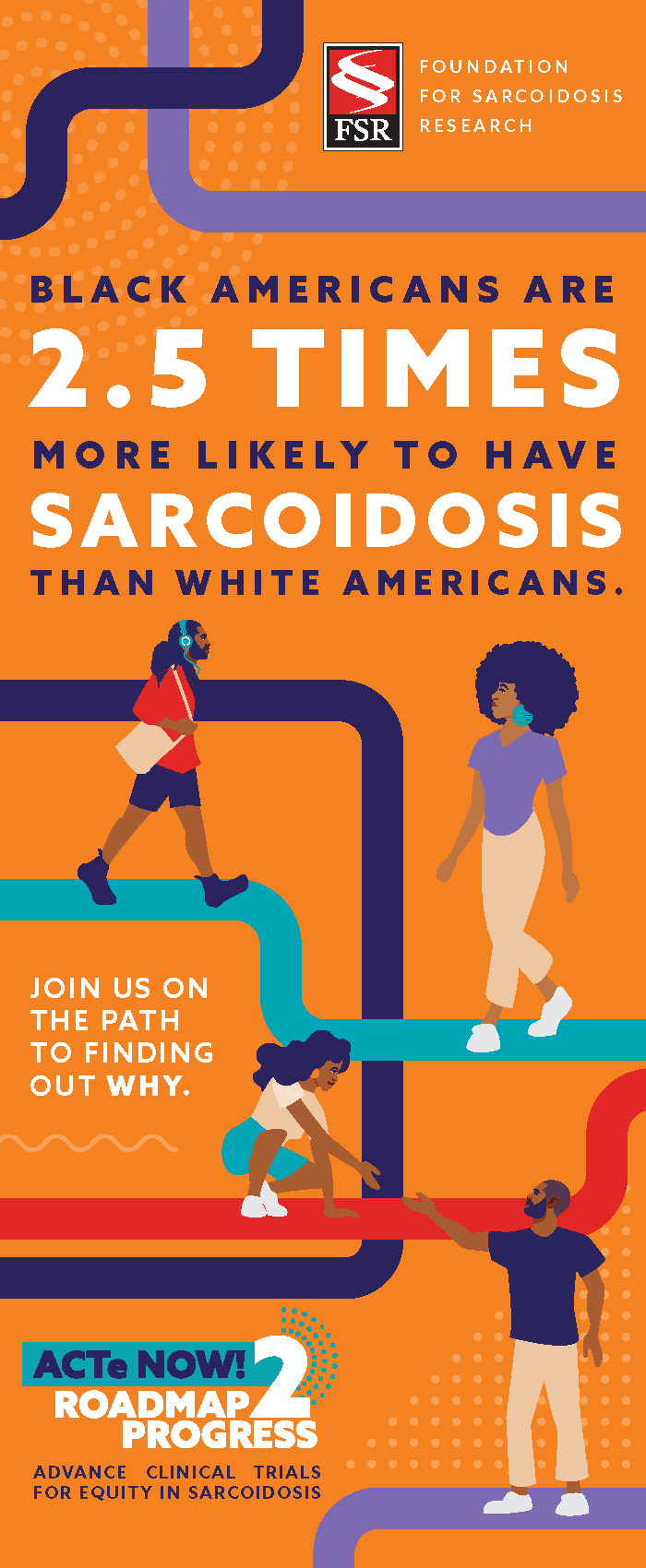
Participating in a clinical trial is a significant decision.
This guide aims to provide you with the necessary information to start conversations, ask the right questions, and consider your options.
Your involvement can lead to advancements in treatment, not just for you but for your community and future generations.
Black Americans and Sarcoidosis: A Call for Action
Sarcoidosis affects Black Americans 2.5 times more than White Americans, often in more severe forms. This leads to dire health outcomes, including higher hospitalization and mortality rates.
Why? The truth is, we're still learning. Historically, clinical trials haven't fully represented Black Americans, impacting the effectiveness of treatments available to you. With only 10% of rare diseases having an FDA-approved treatment, it's crucial to increase clinical trials for sarcoidosis to enhance treatment options. ¹¯²
The need for more treatment options is particularly critical for Black sarcoidosis patients, who studies show are prescribed higher cumulative doses of steroids compared to other groups, which have harmful effects on mental health, fatigue, stress and can lead to other serious health conditions.³ Now, with more sarcoidosis trials than ever, your involvement can drive change for yourself and your community.

Black Americans:
- Are 2.5x more likely to have sarcoidosis than White Americans.⁴
- Are more than twice as likely to have a family member with sarcoidosis.⁵
- Have a hospitalization rate 9x higher than White Americans.⁶
- Are 12x more likely to die from sarcoidosis and at a younger age, than White Americans.⁷
- Receive higher cumulative doses of steroids which have harmful effects on mental health, fatigue, and stress.⁸
Current medications prescribed for sarcoidosis were determined without proper representation of Black Americans in clinical trials. Black Americans only represent 9% of participants for clinical trials for rare diseases.⁹

Why is Diversity in Clinical Trials Important?
Genetic and biological differences can lead to variations in how people respond to treatments. Clinical trials are the pathway through which we can learn how diseases work, how they respond to certain treatments and how those treatments impact different people. When clinical trials lack diversity, it stifles the potential for breakthroughs and reduces the applicability of the findings to all groups. Increasing representation of Black Americans in clinical trials will provide more robust and comprehensive data which will lead to more effective protocols, treatments, and equitable outcomes for Black Americans and all sarcoidosis patients.
Understanding Clinical Trials
A clinical trial tests new medical treatments or procedures in people to check if they are safe and effective. Initially, treatments are tested in labs, and promising results lead to clinical trials. Your participation provides invaluable information, potentially improving healthcare for everyone.
TYPES OF CLINICAL TRIALS:
Shedding Light on Patient Safety:
You won’t be left in the dark when participating in a clinical trial. Clinical trials have built-in protections to ensure you are well-informed and protected every step of the way.
Clinical Trial Design
Each clinical trial is carefully designed following a strict plan of how the clinical trial will work and who is eligible to participate. Before approval for the general population, a treatment must advance through three phases before approval for the general population. The FDA is responsible for reviewing the findings of each phase to make sure the results meet the required safety standards and show potential benefits before granting approval to advance to the next phase. If the results don’t meet the strict standards to continue, the FDA may request additional data, changes to the study design, or stop the development of the treatment.
Decisions regarding the criteria for participation in a clinical trial are made with the participant's safety as the top priority. When considering involvement in a clinical trial, it is important you understand the established criteria. Open and honest communication about your medical history and other pertinent factors outlined in the trial's criteria is essential for you and the researcher to make well-informed decisions that prioritize your safety and best interests.
Understanding Eligibility
The clinical trial should outline factors that researchers are looking for (inclusion criteria) and factors that will disqualify you from participating (exclusion criteria). These factors, referred to as the selection criteria, can include several factors like medical history, age, gender, previous or current treatments, and medical conditions.
Phases of Clinical Trial Design
Benefits of Clinical Trial Participation
There are many benefits to participating in a clinical trial, particularly for Black patients, who report difficulty accessing equitable care. Benefits include:
-
- Receiving more frequent and careful medical attention from a research team that includes doctors and other health professionals.
- Receiving increased access to new treatments, expert clinicians, and advanced technologies before they are widely available.
- Helping your community by contributing to knowledge about new treatments or procedures and their effectiveness in Black patients.
Myths and Facts

When getting started, it is important to:
Questions to Ask Your Provider:¹⁵
Asking questions is crucial. Inquire about the trial's purpose, phase, eligibility criteria, and how it might impact your life. Understand how the treatment will be administered, the frequency of clinic visits, potential side effects, and overall trial duration. Click here for a list of questions to ask your provider when considering participating in a clinical trial.

Explore additional information and resources on clinical trials - click here to read.
Exploration is the first step to discovery! To see clinical trial opportunities are available to you, click here.
Together, we can drive progress and make a lasting impact on the future of sarcoidosis treatment!








